*****
Jacob Greenberg: So, Symbol, my friend, you're a woman.
Symbol Lai: Last I checked, yeah.
Jacob Greenberg: So you're a woman, and an NBA fan.
Symbol Lai: Again, last I checked, yeah.
Jacob Greenberg: Amazing! A female NBA fan. How'd that happen?
Symbol Lai: Well, I grew up with an older brother who loved sports, and my family moved around a lot so a lot of times, it was just me and him keeping each other company. If we were really into football at the time, he'd take me out to run pass patterns, or we'd play touch football with some neighborhood kids. For awhile we were really into hockey, so we played a bunch of street hockey.
Symbol Lai: Well, I don't think I had a sense that little girls were supposed to be clean and wear dresses. I thought it was pretty cool that I could hang with the boys, brush off some hard hits, and maybe kick their asses at some stuff.
Jacob Greenberg: That's hardcore. So why do you love the NBA?
Symbol Lai: Well, I love the NBA for three big reasons. First, even though my family's all pretty short, my parents had this crazy idea that they could combat genetics by encouraging me to play basketball, which required lots of jumping. To that end, they bought me and my brother a nice Spud Webb basketball instructional video when I was six or seven. I can't say that I actually used to basketball video to improve my basketball skills, but I did watch it a lot, and thought it was pretty cool. It's even cooler now knowing that he won a few dunk championships back in the day. I find the irony of some superstar short guy teaching me--at a towering four-feet-ten-inches--about ball absolutely hilarious.
Jacob Greenberg: That's golden.
Symbol Lai: Yeah. It's stuff like this that makes me value growing in a first-generation immigrant family. I wouldn't trade it for the world. It's just so much fun.
Jacob Greenberg: So Spud Webb is your first reason you love the NBA. What's your second?
Symbol Lai: A second reason I love the NBA was that I love me some TV and TV-related entertainment. I always have. I always will. And like most kids, I probably watched the most TV on Saturday mornings, which meant that, at some point, "Inside Stuff" with Ahmad Rashad would come on.
Jacob Greenberg: My main man Ahmad Rashad! That show was the shit. Whazzup, 1994?
Symbol Lai: I don't really remember what he said, but I remember his face, the theme song, and liking the show a lot. I also had a Sega Genesis and spent more time than I should have playing NBA Jam.
Jacob Greenberg: Boomshakalaka! So, that's two. What's the third?
Symbol Lai: The final and perhaps most important reason why I follow the NBA is that my family and I finally settled down at the right place and right time. We finally planted our roots in the South Jersey-Philly area just in time for the renaissance of Philadelphia basketball. Although the Sixers had pretty much stunk after Charles Barkley left? It was during those years that the franchise really started rebuilding.
Jacob Greenberg: Say more.
Symbol Lai: Well, first, they came under Pat Croce's ownership, which just breathed new life into a dying institution with an updated logo, a terrifying, steroid-abusing mascot, and good, old fashioned gimmicky half-time shows. Second, the Sixers got a new coach in Larry Brown, who was famous for being a teacher and building contending teams. Third, and most importantly, the team lucked out and got two high draft picks, which we used first on the never-panned-out-for-us guard Jerry Stackhouse in 1995, but then in 1996, used the #1 overall pick on The Answer, Allen Iverson.
Jacob Greenberg: Man, good times.
Symbol Lai: They were. It also didn't hurt that Stephen A. Smith, who currently collects a fat paycheck for doing little on ESPN, was beginning his career writing about Sixers' ball for the region's premier newspaper, The Philadelphia Inquirer. I mean, simply put, in my opinion, there just wasn't a better time and place to start learning the ins-and-outs of the game. I mean, how can you NOT love the game when night-in-and-night-out you're watching Allen Iverson single-handedly carry an under-talented, overachieving team to the NBA championships --
Jacob Greenberg: Yeah, but he only did it once.
Symbol Lai: Sure, but regardless, he did it. And most of the time, he did it without the support of the national and local media, and his own head coach, for heaven's sake. He was just so amazing to watch. Not only was he near-unguardable, and made some of the league's best defenders look silly (like Michael Jordan, and Kobe Bryant), he played with so much heart, repeatedly leading the league in minutes played, and with no discernable regard for his body. He took so many hits and just kept on playing, never minding injuries, and playing like basketball would vanish from all of existence the next day.
Jacob Greenberg: One might argue that that mentality did lead basketball to vanish permanently for him, by the time he blew shots in Memphis and even Philly again in 2009.
Symbol Lai: Maybe. But that's a different time, and a different Iverson. It was very inspiring at the time, and even more so for a city that loves a scrappy, underdog story. "Rocky", anyone?
Jacob Greenberg: Great movie, indeed.
Symbol Lai: Yep. And while we're talking about Iverson, let me mention that, for a young, budding radical, Iverson had the added appeal in that he was perhaps the first player to bring attention to what everyone with a socially-conscious brain knew, but never said: that most of the players in the NBA were from the 'hood, but the NBA itself was a very "white" institution that pressured its players to conform to a certain character that mainstream America could find men of color growing up in poverty-stricken areas terrorized by the police palatable. I really respect the fact that Iverson openly flouted the conventions that the NBA and media placed on the players who fueled the institution. At a time when the league's dominant image was clean-shaven players whose private lives were supposed to be straingt and narrow, of the 1950s Americana variety, here was a guy that unapologetically cornrowed his hair, tattooed his body, and refused to ditch "the posse" with whom he had grown up with and had carried him all the way to the NBA.
Jacob Greenberg: I agree, 100%. Yet, dude made some mistakes.
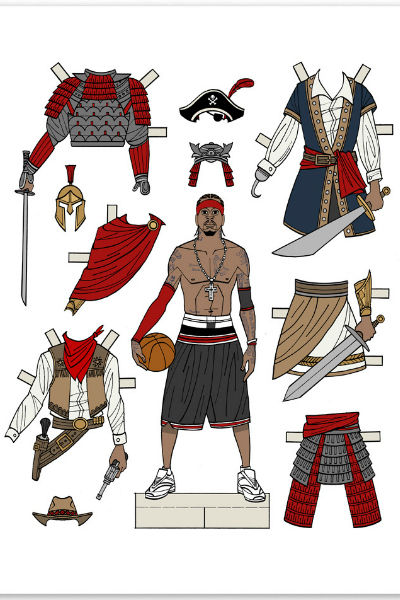 |
| from freedarko.com |
Symbol Lai: Well, to be clear, my intention here is not to heroicize the man at all. Like the rest of us human beings, A.I. had his flaws. The point I do hope to get through is that there is something to be said about the fact that all the mishaps instantly drew a loud clamor from his critics that were often based on racially-charged images like the "selfish, lazy, young black criminal." For me -- and not to get all corny and stuff -- I learned in my formative years from A.I. a lot about how racially charged comments by supposedly objective NBA analysts could be, and how there was absolutely no shame in staking claims in an unequal system on your own terms. I hope he gets his stuff figured out and if I were his friend, I'd give him a nice, big hug, send him lots of positive thoughts, and check regularly to make sure he was doing okay.
Jacob Greenberg: Yeah. His end was so sudden. And really, his story doesn't seem finished. Anyways, enough about Iverson. Let's talk about women in sports, and specifically the NBA.
Symbol Lai: Alright.
Jacob Greenberg: So, in my opinion, the NBA is dominated by men. The only woman in any position of power is Violet Palmer, who is a referee. There are no female head coaches, assistant coaches, GMs, assistant GMs, scouts, etc. Is this a problem? And if so, how big of a problem is this?
Symbol Lai: Well. Jacob. It is a problem. And believe it, or not, it is a problem that's so big that it's not isolated to the NBA. Sports, and anything to do with it, except for probably figure skating, gymnastics, and softball, is male-dominated. That is all. End of story.
Jacob Greenberg: So, do you have any ideas about how to rectify this problem?
Symbol Lai: Geez, Jacob. Way to tokenize me.
Jacob Greenberg: [Hangs head in shame]
Symbol Lai: Sigh. Well, the easy, obvious answer is to start hiring more women into executive, decision-making positions. Start some sort of gender equity committee where they can decide on what what constitutes "equity" and probably legislate the possible sexual harassment cases.
Jacob Greenberg: The recent one involving Stephon Marbury, Isiah Thomas and Anucha Browne Sanders comes to mind. But that was a case of a female executive with the Knicks. She had risen to a position of power, only to get forced from her job, with nothing to show for it save for some measure of financial restitution. That doesn't seem like progress.
Symbol Lai: The thing is, while I am a feminist, I'm not of the school that believes that sexism can simply be rectified by importing female bodies. I think there's plenty of examples to show how this flawed strategy continues to reproduce social inequities. Take affirmative action in graduate education, for example. Even though there are more students of color in higher education, I think you'd be hard pressed to find any one in their right mind that will say that education is less racist, given how race dynamics play out in play out in department politics, weekly seminars, or quotidian interactions with advisers.
Jacob Greenberg: Ain't that the truth.
Symbol Lai: All of that is to say, I don't have a solution for this problem because you're gonna have to somehow rid society of patriarchy altogether, and that, unfortunately is a dragon too big for the NBA to slay.
Jacob Greenberg: A...dragon?
Symbol Lai: You heard me. However, what might be a nice start to an interesting experiment is to hire some smart, tough, women ballers similar to Cheryl Miller to be announcers. Someone who won't let the dudes run all over her, knows the game to give incisive commentary, and can ball in a way all the boys can respect.
Jacob Greenberg: That's a great idea. So, let's talk Sixers?
Symbol Lai: Yeeeaaaaaah!
Jacob Greenberg: You're our resident Sixers fan. The Sixers don't get a ton of national press or media exposure. You watch nearly every Sixers game. What are some basics we should know about this team?
Symbol Lai: First and foremost, this team is a lot of fun to watch. Admittedly, I wasn't that impressed when I first started watching the Sixers this season; they play a different style of ball that takes some time to get used to because I think the dominant form in the league is to build teams around two-to-three franchise players who will make nightly highlight reels.
Jacob Greenberg: The Miami Heat model.
Symbol Lai: Right. Now, the Sixers don't have that. Their biggest player is Andre Iguodala, who is a fundamentally sound player, but neither bursting with explosive athleticism nor gifted with good instincts. Next to Iggy, you have -- I don't know -- Jrue Holiday? Elton Brand?
Jacob Greenberg: Lou Williams?
Symbol Lai: Point is, the Sixers don't have a bona fide superstar, which means they really have to gel as a team for any sort of winning formula to work. They all have to play defense. They all have to rebound. They have to spread the ball around. They all have to score pretty much equally. They all feed off each other's energy. Watching how the team rides each other's waves just sucks in the fans and wins them over. (It also helps that all the guys just seem so wide-eyed and goddamn earnest).
Jacob Greenberg: Evan Turner, especially.
Symbol Lai: Second, y'all gotta know that the Sixers are absolutely tenacious. Whereas teams playing catch-up for the most of the game might begin faltering in spirit and take a pummeling as the game wears on, the Sixers are a team that will not go away. With the exception of the Heat game, the Sixers haven't racked up one of those big heart-wrenching losses when you literally watch a team deflate before your eyes. Though they trail often in the first half, Doug Collins usually makes some brilliant, understated observation that re-energizes his team without infantalizing them or makes the necessary adjustments during halftime so that when they come back in the second half, it's a completely different team.
Jacob Greenberg: Their game against the Hawks on January 20th is a good example of this.
Symbol Lai: Yes. So, third, I think everyone -- myself included -- needs to keep in mind that this is a young team that was not slated to be first in the Atlantic Division, much less expected to regularly occupy a high spot on John Hollinger's power rankings. Precisely because they've stunned everyone with an incredible start, during which they've handily deconstructed teams bit-by-bit for blowout wins, the questions that informs our analysis of the team is whether or not this great run is a fluke attributable to a easy schedule and and atrocious play by the presumed contenders (that is, New York and Boston). I think that everyone -- and again, myself included -- should also remember that the Sixers were 3-13 last year at around the same time. Also, because the Sixers are, for all their success, still rebuilding, there are some losses that we can consider victories because of how they fared. Most importantly, the real test to this team's playoff chops will be coming in the next month.
Jacob Greenberg: Things have gotten sort of interesting for them, and they've met the challenge. They beat Chicago and Atlanta, but lost to Miami.
Symbol Lai: And they've got the Lakers, San Antonio and the Clippers. This is a brutal schedule for a young team, and how they do against these teams will speak to whether or not they deserve the attention they've gotten recently.
Jacob Greenberg: Well, before they beat Chicago and Atlanta, they had come down to earth a bit, losing a few games to some weaker teams. What was going on, there?
Symbol Lai: I think they might have been getting worn down a bit. The team hadn't been rallying in the same way. They weren't making defensive plays or converting turnovers into as many fast break points, which plays against the Sixers' preferred tempo of play. Excluding Lou Williams, the rest of the team hadn't been getting into double digits, as they usually did. During that stretch, we lost our two big guys, Spencer Hawes and Nikola Vucevic, which affects how we play in the post.
Jacob Greenberg: So what's going to help this team grow?
Symbol Lai: Well, some practice time, for one. Doug Collins brought this up in a post game press conference not too long back. He said that when players start hitting their slump, practice time helps regain their confidence. They won't have a full practice until THE MONDAY AFTER THE ALL STAR GAME. That means that the players will have to work through their slumps on court. Also, some road games will help. Collins stated after a recent win to the Bobcats that the team needs to go on the road because that's when the team gets tested physically and mentally. Philly sportswriter Bo Kimble said that Collins probably feels that the team's gotten a little complacent with playing some low-stakes teams at home.
Jacob Greenberg: How do we know if this team's for real?
Symbol Lai: By how they play this February. After the next three games, all against Western Conference playoff teams, we have a short break against Cleveland (who are a borderline playoff team) and Charlotte. Then: Orlando, Dallas, Minnesota, Memphis, Houston, Detroit (hopefully a break), and OKC.
Jacob Greenberg: Yikes.
Symbol Lai: Yeah. It'll be interesting to see how the Sixers play because their success is continent upon their mental and physical stamina.
Jacob Greenberg: Well shit, you know your stuff. In any case, let's move on to some stuff from the blogosphere. One of the more interesting pieces from this season -- and a piece we have both read -- was this article from the Wages of Wins Journal, which argues that the Sixers, as the city's fourth biggest draw, fails to attract fans not because they don't have a bona fide star, but because over the last few years, they just statistically haven't been that good. Do you agree or disagree?
Symbol Lai: Sure, I agree. No one's gonna spend money to watch a losing team. I sure wouldn't. Losing sucks. It's disheartening.
Jacob Greenberg: Yet folks are coming out to see the games these days. At least, some days.
Symbol Lai: Sure. They're winning. I don't think that the team needs a superstar to sell tickets. I think word's getting out that basketball's back in the city, and with some time, things will pick back up. Though it seemed like the stadium was a little empty at the Wizards games the past two weeks, I am tempted to think that it was because the Sixers were playing a horrible team, who have made frequent trips to Philly this season. I think this next stretch of high-stakes games against playoff teams will, in addition to drawing bigger crowds, determine whether the fire will catch.
Jacob Greenberg: It'd be great. I remember those Philly crowds during the Iverson years. Loud and critical. Really a great national television crowd.
Symbol Lai: It's been a looooooooong time since the fans felt this excited -- uplifted, even -- from watching good basketball. Some would say the drought started after the 2001 Finals team. It's just going to take some time for the team to rebuild the relationship.
Jacob Greenberg: So, what's the ceiling for this Sixers team?
Symbol Lai: I don't know, man. As much as I live and die for this team, I don't want to get my hopes up. I've been waiting for the other shoe to drop. Ask me again after this seven-game stretch of games is over. I liked the wins against Chicago and Atlanta, but the Miami loss was a bummer. We just have to see.
Jacob Greenberg: Okay. Well, let's finish up by talking about Philadelphia sports fans, who are famously critical of their teams, players and coaches. Do you think Philly fans respect loyalty or talent more?
Symbol Lai: I don't know if I'd put it as an either / or question. Obviously, talented players that electrify the stadium and city -- mostly by taking teams to a championship -- are the ones we remember. And we will glorify the player even more if he or she loves the city back by realizing that Philly is one hell of a sports town.
Jacob Greenberg: Well, seemingly, that only stands as long as your player is young and producing. Think about how they turned on Donovan McNabb when he started showing his age.
Symbol Lai: The trope of Philly fans as ageists?
Jacob Greenberg: Something like that.
Symbol Lai: You might be right. Ageists who turn on their players when their game declines due to their ugly, decrepit, wrinkling bodies. We did do that to McNabb. And we didn't show much love to Eric Lindros, either.
Jacob Greenberg: I don't know who that is, but sure. Eric Lindros, too, God save his soul.
Symbol Lai: Hockey? Hello? Anyways, even though Philly fans might be some ageist motherfuckers, I'd like to characterize the relationship we have with our sports players as tried and true relationships. You have your good times. But, since the city tends to have very short memories, there's a series of nasty fights, when championships don't pan out. Then, there's some time apart because the player leaves. For a while, when the break up first happens, it's all, "Good riddance. They whined too much" from both parties. Then, after a period of time, the city comes to realize how much the said star did for that sport when he was around -- how exciting it was to follow that team's trials and tribulations for that short period. The player, in turn, seems to get to the point when he's able to give the city and its fan base due credit for their fervor and passion.
Jacob Greenberg: You, of course, are alluding to Allen Iverson's short-lived return to Philadelphia in 2009, yes?
Symbol Lai: Yeah. And of course, if there's some alumni game or some number-retiring ceremony, there's a warm reconciliation that will bring tears to everyones' eyes.
Jacob Greenberg: You mean when Sir Charles got his number retired by the Sixers?
Symbol Lai: No, to the Flyers Winter Classic Alumni Game when Eric Lindros -- whom, we might recall, at 6'4'', was the biggest, overpaid, underachieving baby that sat out for weeks due to a dumb charlie horse and took early retirement -- got the longest, loudest, most appreciative standing ovation from the fans. Even Bobby Clark who took home the Stanley Cup didn't get such a reception. After that, I believe anything is possible.
Jacob Greenberg: Hm. Guess I had to be there. Well, that's that. Any last words?
Symbol Lai: It's great. I love it. Philly's the best. Go Sixers!!!



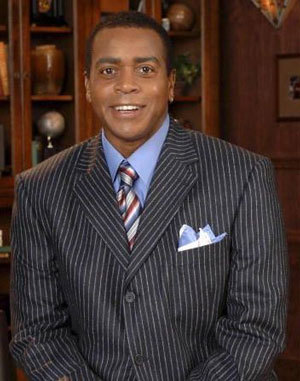




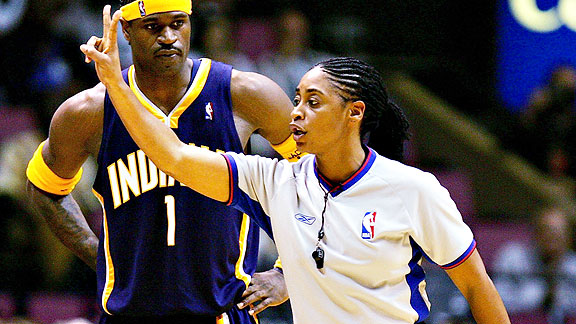



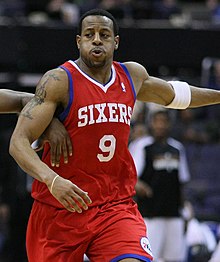

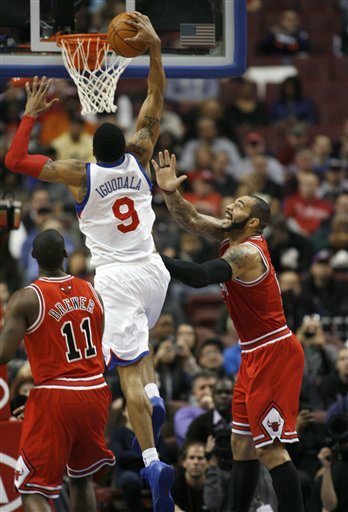




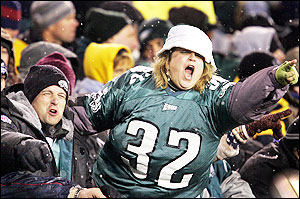



No comments:
Post a Comment